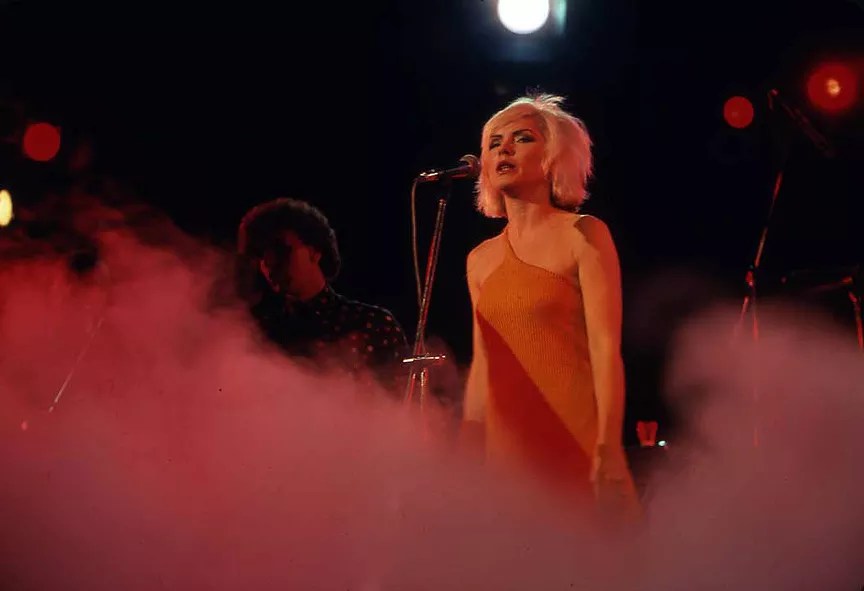
Courtesy Blondie

Audio By Carbonatix
Clem Burke, the longtime drummer of seminal new-wave rock band Blondie, talks about the group’s 1970s beginnings as if he’s reminiscing about high school.
Their classrooms were clubs such as CBGB and Max’s Kansas City, where Blondie vocalist Debbie Harry once worked as a waitress, while Burke and his fellow soon-to-be-famous peers – including the Ramones, Patti Smith Group, Talking Heads, Television, Dead Boys, Johnny Thunders and the New York Dolls – made Manhattan’s Lower East Side the epicenter of American music during that time.
Now, fifty years after making their mark, Burke keeps in touch with those still around from back then. In fact, Burke and Cheetah Chrome of Dead Boys were recently in the studio together, working on some of Chrome’s solo material.
“It’s funny the connection with people from back in the day. It’s like people that you went to school with,” Burke says in his native New Jersey accent. “There was a time when you would see these people virtually every day at places like CBGB and Max’s.”
Since then, that creative period, as well as those places, have been steeped in legend and lore, Burke realizes.
“There were no CBGB T-shirts at CBGB. There were virtually no punk-rockers at CBGB. When it began, it was basically a very New York, Lower East Side bohemian atmosphere,” he shares. “CBGB was more or less like a cabaret at the beginning, with tables with little candles on them, like if you were going to a folk club or something. There weren’t people slam dancing. As you can imagine, 100 people sitting in chairs with little candles burning watching the Ramones is more like an art piece.
“Of course, it changed when it became more recognizable,” Burke continues, adding that CBGB owner Hilly Kristal only required bands to play original music when he opened the club in 1973. “It gave us a workshop to be able to make our mistakes in public. That was essential for most of those bands.”

In this undated photo, Blondie singer Debbie Harry gets lost in a shroud of pink fog.
Courtesy Blondie
When it came to Blondie, that also allowed Burke and his bandmates to come up with a genre-hopping formula that garnered an early underground following before the success of their third album, Parallel Lines, in 1978. Behind hit singles “Heart of Glass” and “One Way or Another,” Parallel Lines made Blondie a mainstream mainstay, and proved to be influential to the ensuing post-punk and new-wave movements of the 1980s, even after the group called it quits in 1982. Earlier this year, the record was selected for preservation in the National Recording Registry by the Library of Congress for being “culturally, historically, or aesthetically significant.”
“We were very pleasantly surprised,” Burke says of the recent honor. “As time goes on, we seem to be getting handed more and more accolades.”
Since reuniting in 1997 after a fifteen-year hiatus, Blondie has recorded five more albums and was inducted into the Rock and Roll Hall of Fame in 2006. With the recent release of a new box set, Against the Odds: 1974-1982, featuring Blondie’s first six records, the band is now busy touring and will play Mission Ballroom on Wednesday, May 8.
Besides Harry and Burke, Blondie currently comprises original guitarist Chris Stein, guitarist Tommy Kessler, bassist Glen Matlock and multi-instrumentalist Matt Katz-Bohen. Of course, Blondie is going to play all the hits that have become universally loved – “The Tide Is High,” “Call Me,” “Maria” – but Burke is still excited about what comes next. “From the time we got back together, it was always about creating new music at the same time as playing the catalogue,” he says.
While nothing has officially been announced just yet, Burke mentions that Blondie is working on a new album, its twelfth, that the band plans to share sometime next year. While the music biz might have changed a bit since Blondie’s 1976 self-titled debut, the band’s vision and penchant for dipping into different styles, whether it be R&B or reggae, doesn’t seem so out of pocket nowadays.
“I think a lot of our ideas became more commonplace with musicians as time went on. We were just ahead of the curve a little bit,” Burke says. “We always had that eclecticism. You never knew what to expect from bands like the Beatles, the Stones or David Bowie. They were always changing musically and broadening their musical horizons. We always looked at ours like that, like an anything-goes attitude.”
It helped that Blondie had a knack for writing catchy songs, too, that became part of the pop-culture zeitgeist. “A big part of the legacy of the band are the songs,” he continues. “The songs seem to have endured even through our hiatus in the ’80s and early ’90s. The songs continued to be played.”
It’s hard for Burke not to get a little nostalgic when thinking about Blondie’s legacy. He mentions the late Dee Dee Ramone and Thunders, two Lower East Side alumni who aren’t around to see the impact they had on American music.
“You don’t really want to look back, but the music that came out of that era – I don’t know if I’m in a bubble, but it seems to have endured,” he concludes.
Blondie, 7 p.m. Wednesday, May 8, Mission Ballroom, 4242 Wynkoop Street. Tickets are $60.